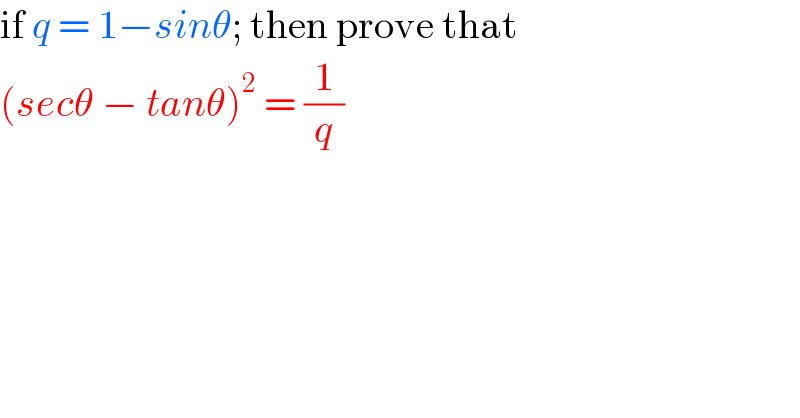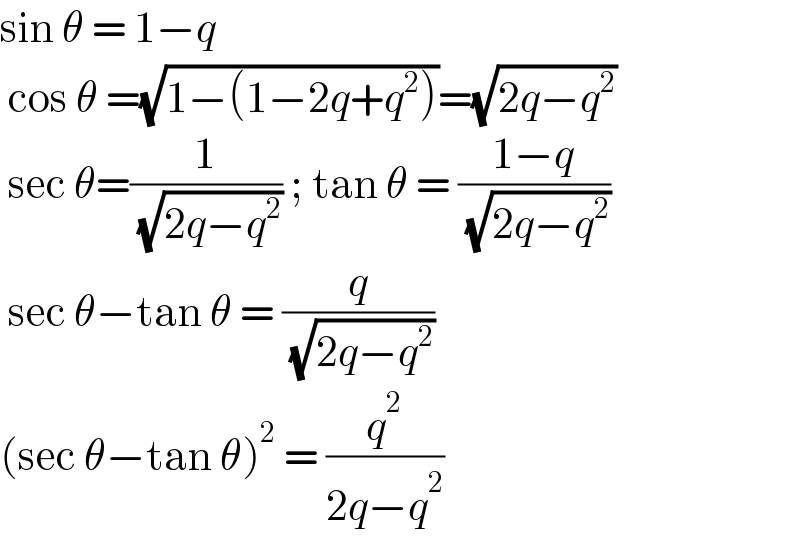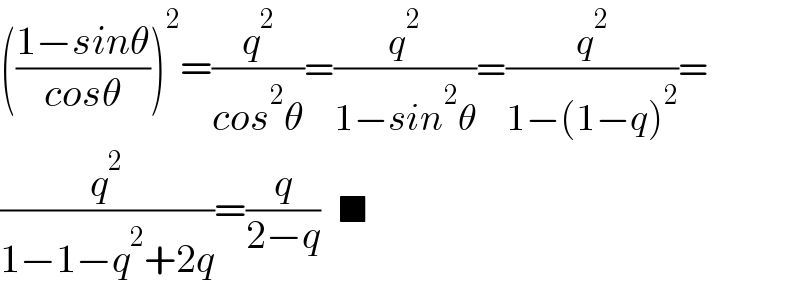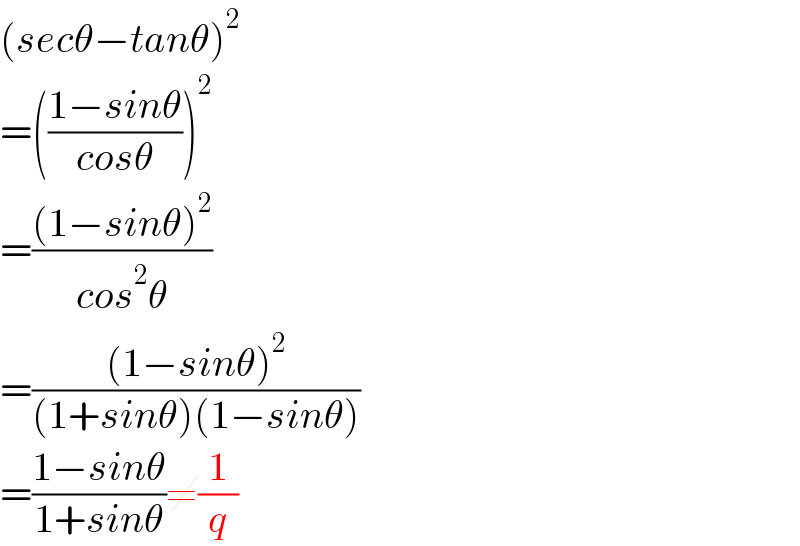
Question Number 159845 by abdullah_ff last updated on 21/Nov/21

$$\mathrm{if}\:{q}\:=\:\mathrm{1}−{sin}\theta;\:\mathrm{then}\:\mathrm{prove}\:\mathrm{that} \\ $$$$\left({sec}\theta\:−\:{tan}\theta\right)^{\mathrm{2}} \:=\:\frac{\mathrm{1}}{{q}} \\ $$
Commented by tounghoungko last updated on 21/Nov/21

$$\mathrm{sin}\:\theta\:=\:\mathrm{1}−{q}\: \\ $$$$\:\mathrm{cos}\:\theta\:=\sqrt{\mathrm{1}−\left(\mathrm{1}−\mathrm{2}{q}+{q}^{\mathrm{2}} \right)}=\sqrt{\mathrm{2}{q}−{q}^{\mathrm{2}} } \\ $$$$\:\mathrm{sec}\:\theta=\frac{\mathrm{1}}{\:\sqrt{\mathrm{2}{q}−{q}^{\mathrm{2}} }}\:;\:\mathrm{tan}\:\theta\:=\:\frac{\mathrm{1}−{q}}{\:\sqrt{\mathrm{2}{q}−{q}^{\mathrm{2}} }} \\ $$$$\:\mathrm{sec}\:\theta−\mathrm{tan}\:\theta\:=\:\frac{{q}}{\:\sqrt{\mathrm{2}{q}−{q}^{\mathrm{2}} }} \\ $$$$\left(\mathrm{sec}\:\theta−\mathrm{tan}\:\theta\right)^{\mathrm{2}} \:=\:\frac{{q}^{\mathrm{2}} }{\mathrm{2}{q}−{q}^{\mathrm{2}} }\: \\ $$
Answered by JDamian last updated on 21/Nov/21

$$\left(\frac{\mathrm{1}−{sin}\theta}{{cos}\theta}\right)^{\mathrm{2}} =\frac{{q}^{\mathrm{2}} }{{cos}^{\mathrm{2}} \theta}=\frac{{q}^{\mathrm{2}} }{\mathrm{1}−{sin}^{\mathrm{2}} \theta}=\frac{{q}^{\mathrm{2}} }{\mathrm{1}−\left(\mathrm{1}−{q}\right)^{\mathrm{2}} }= \\ $$$$\frac{{q}^{\mathrm{2}} }{\mathrm{1}−\mathrm{1}−{q}^{\mathrm{2}} +\mathrm{2}{q}}=\frac{{q}}{\mathrm{2}−{q}}\:\:\:\blacksquare \\ $$
Answered by som(math1967) last updated on 21/Nov/21

$$\left({sec}\theta−{tan}\theta\right)^{\mathrm{2}} \\ $$$$=\left(\frac{\mathrm{1}−{sin}\theta}{{cos}\theta}\right)^{\mathrm{2}} \\ $$$$=\frac{\left(\mathrm{1}−{sin}\theta\right)^{\mathrm{2}} }{{cos}^{\mathrm{2}} \theta} \\ $$$$=\frac{\left(\mathrm{1}−{sin}\theta\right)^{\mathrm{2}} }{\left(\mathrm{1}+{sin}\theta\right)\left(\mathrm{1}−{sin}\theta\right)} \\ $$$$=\frac{\mathrm{1}−{sin}\theta}{\mathrm{1}+{sin}\theta}\neq\frac{\mathrm{1}}{{q}} \\ $$
